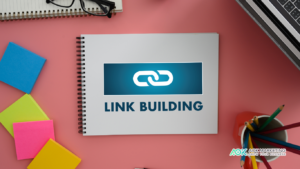Link building is a powerful strategy for improving a website’s ranking in search engine results. Whether you’re a seasoned marketer or new to digital strategy, understanding the intricacies of link building is essential for boosting your online visibility and driving organic traffic. This article will explain what link building is, why it’s critical for SEO, and how to implement it effectively for optimal results.

What Is Link Building?
Link building refers to the process of acquiring hyperlinks from other websites to your own. These hyperlinks, or simply “links,” are seen by search engines as endorsements or votes of confidence. Each time another website links to your content, it signals to search engines that your site is authoritative, trustworthy, and relevant to specific keywords or topics.
Links act as pathways between different pages on the web, and they help both users and search engines discover new content. When done correctly, link building can significantly enhance your site’s credibility and search rankings, positioning you as an expert in your industry.
Why Is Link Building Important for SEO?
Link building plays a crucial role in SEO for several reasons:
Improves Search Rankings: Search engines like Google use links as one of their key ranking factors. Pages with a high number of quality backlinks typically rank higher in search engine results pages (SERPs). When reputable websites link to yours, it enhances your domain authority and signals to Google that your content is valuable.
Increases Organic Traffic: Quality links can drive referral traffic directly to your site. When users click on links pointing to your pages, they discover your content, increasing your visibility and traffic without relying solely on search engine results.
Enhances Credibility and Trust: Acquiring backlinks from authoritative sites helps establish your website as a credible source of information. Trust is vital for both search engines and users. When other reputable sites link to yours, it can boost your brand’s reputation in the digital space.
Faster Indexing: Search engines use bots to crawl websites. If your site is well-linked, both internally and externally, these bots can discover new content faster, leading to quicker indexing and updates in search rankings.
Types of Links in SEO
Not all links are created equal. Understanding the different types of links and how they impact SEO is key to a successful link-building strategy.
Internal Links: These are links between pages within your own website. Internal linking helps search engines understand the structure of your site and distributes “link juice” across various pages. It also encourages users to navigate through your content seamlessly.
External Links (Backlinks): These are links that come from other websites to your site. They are the most valuable type of links for SEO, as they serve as endorsements from outside sources.
DoFollow Links: These links pass on link equity or “link juice,” helping to boost the linked page’s search rankings. Most SEO-focused link-building efforts target dofollow links, as they directly influence a site’s authority.
NoFollow Links: These links tell search engines not to follow the link or pass any authority. While nofollow links don’t directly boost SEO rankings, they can still drive traffic and contribute to your site’s overall visibility.
White Hat vs. Black Hat Link Building
When it comes to link building, there are ethical (white hat) and unethical (black hat) methods. Search engines are strict about penalizing sites that use manipulative tactics to gain links, so it’s essential to understand the difference.
White Hat Link Building: These are ethical link-building strategies that focus on creating valuable, high-quality content that naturally attracts backlinks. White hat techniques include guest blogging, creating shareable content, and collaborating with industry influencers.
Black Hat Link Building: This involves unethical practices such as buying links, using link farms, or participating in link exchange schemes. These practices violate Google’s guidelines and can lead to severe penalties, including being removed from search results.
Link Building Strategies That Work
Now that you understand what link building is and why it’s important, let’s dive into some proven strategies that can help you build a robust link profile.
1. Guest Blogging
Guest blogging involves writing content for other reputable websites in your niche. In exchange, you receive a backlink to your site, typically in the author bio or within the content itself. This strategy not only helps you build links but also allows you to tap into new audiences and establish thought leadership.
2. Create High-Quality, Link-Worthy Content
Content is the foundation of any successful link-building strategy. By creating valuable, informative, and engaging content, you increase the likelihood that other websites will want to link to your site. This can include blog posts, infographics, case studies, or how-to guides. The more unique and useful your content, the more likely it will be shared and linked to by others.
3. Broken Link Building
This technique involves finding broken links on other websites and suggesting your content as a replacement. Tools like Ahrefs or Moz can help you identify broken links on relevant sites. This approach provides value to the website owner by helping them fix broken links while securing a backlink for your site.
4. Skyscraper Technique
The Skyscraper Technique involves identifying high-ranking content in your niche and creating a better, more comprehensive version of it. Once you’ve created superior content, you reach out to websites that linked to the original piece and suggest they link to your updated, improved version instead.
5. Influencer Outreach
Building relationships with influencers or bloggers in your industry can lead to natural backlinks. By collaborating with influencers on content, reviews, or promotions, you can gain exposure and links from reputable sites within your niche.
6. Leverage Social Media
Although social media links are typically nofollow, they can still drive traffic to your content and increase its visibility. When people share your content on social platforms, it has a higher chance of being seen by website owners or bloggers who may choose to link to it on their sites.
How to Evaluate Link Quality
When building links, it’s important to focus on quality over quantity. Here’s how to assess the value of a link:
Domain Authority (DA): Websites with higher DA are more valuable for backlinks. Tools like Moz or Ahrefs can help you check a site’s DA score.
Relevance: Links from sites that are relevant to your niche or industry carry more weight than those from unrelated websites.
Traffic: A link from a site with high traffic can drive more referral visitors to your site and contribute to SEO value.
Anchor Text: The clickable text in a hyperlink (anchor text) should be relevant to the content it’s linking to. Avoid over-optimized or spammy anchor text, as this can lead to penalties.
Conclusion
Link building is a vital component of any SEO strategy. By acquiring high-quality backlinks from reputable sites, you can improve your search rankings, drive more traffic, and boost your site’s credibility. However, it’s essential to focus on ethical link-building techniques and prioritize quality over quantity. When done right, link building can be a game-changer for your SEO efforts, helping you stand out in a crowded digital landscape.
By understanding what link building is and how to implement it effectively, you can improve your website’s authority and achieve long-term SEO success.
About The Author
Dave Burnett
I help people make more money online.
Over the years I’ve had lots of fun working with thousands of brands and helping them distribute millions of promotional products and implement multinational rewards and incentive programs.
Now I’m helping great marketers turn their products and services into sustainable online businesses.
How can I help you?




